Ben & Jerry’s, Colgate, Dove, Pantene and KitKat are just some of the thousands of popular brands that use palm oil. But where does that palm oil come from?
Palm oil is a commodity in massive demand for its use in a wide range of basic products from ice-cream and chocolate to shampoo and toothpaste.
Most companies will tell you that the palm oil they use is “sustainable” – meaning that it is environmentally friendly and the workers are treated fairly.
But an Amnesty International investigation has revealed that some of the world’s biggest companies – including Colgate, Nestlé and Unilever – are contributing to child labour and wretched conditions for other workers on palm oil plantations.
Abuses are also taking place on plantations run by companies who are certified as “sustainable”, meaning even brands you buy marked as made with “sustainable” or “certified palm oil” could be tainted by human rights abuses.
This means that much of the palm oil in the products in your shopping basket could be tainted by human rights abuses, even when the label says “sustainable”.
“I don’t go to school…I carry the sack with the loose fruit…It is difficult to carry it, it is heavy…My hands hurt and my body aches.”
A 10-year-old boy who helps his father collect palm fruit
In Demand – The Palm Oil Sector
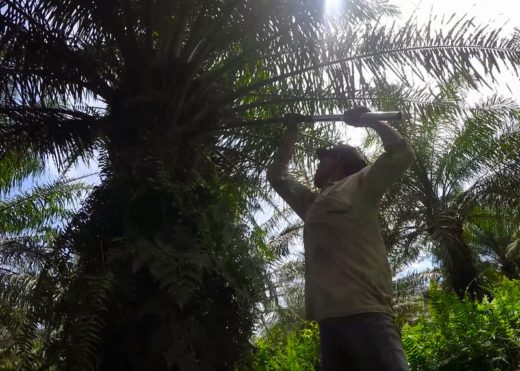

The price of palm oil
Global demand for palm oil makes it a lucrative business, but at the price of workers’ misery. Amnesty International investigated the Indonesian palm oil plantations that supply the world’s biggest palm oil trader, Wilmar, and found forced labour, low pay, exposure to toxic chemicals and discrimination against women – employed as casual workers, without pensions and medical insurance.
To meet the food and household sectors’ hunger for a cheap and versatile crop that can be used to manufacture anything, workers are pressurized and threatened to work ever-longer hours, doing physically demanding tasks such as manually cutting fruit from trees 20 metres tall.
To get paid, workers have to cut, carry, spray and collect large numbers of palm fruits to meet ridiculously high targets. This can leave workers in significant physical pain, and they also face a range of penalties for things like not picking up palm fruits from the ground and picking unripe fruit.
It is difficult work because the target is horrifying…My feet hurt, my hands hurt and my back hurts after doing the work.
A worker on a plantation
Instead of taking steps to improve working conditions for its staff, Wilmar has tried to intimidate them into silence. At a meeting with trade union representatives in January 2017, Wilmar asked workers to sign a document which stated that the abuses outlined in Amnesty International’s report were not taking place on their plantations. Workers on plantations live in fear of reprisals for speaking out about their working conditions – they fear being moved away from their families to a different plantation, or even losing their jobs entirely.
How much does Wilmar pay its palm oil plantation workers?
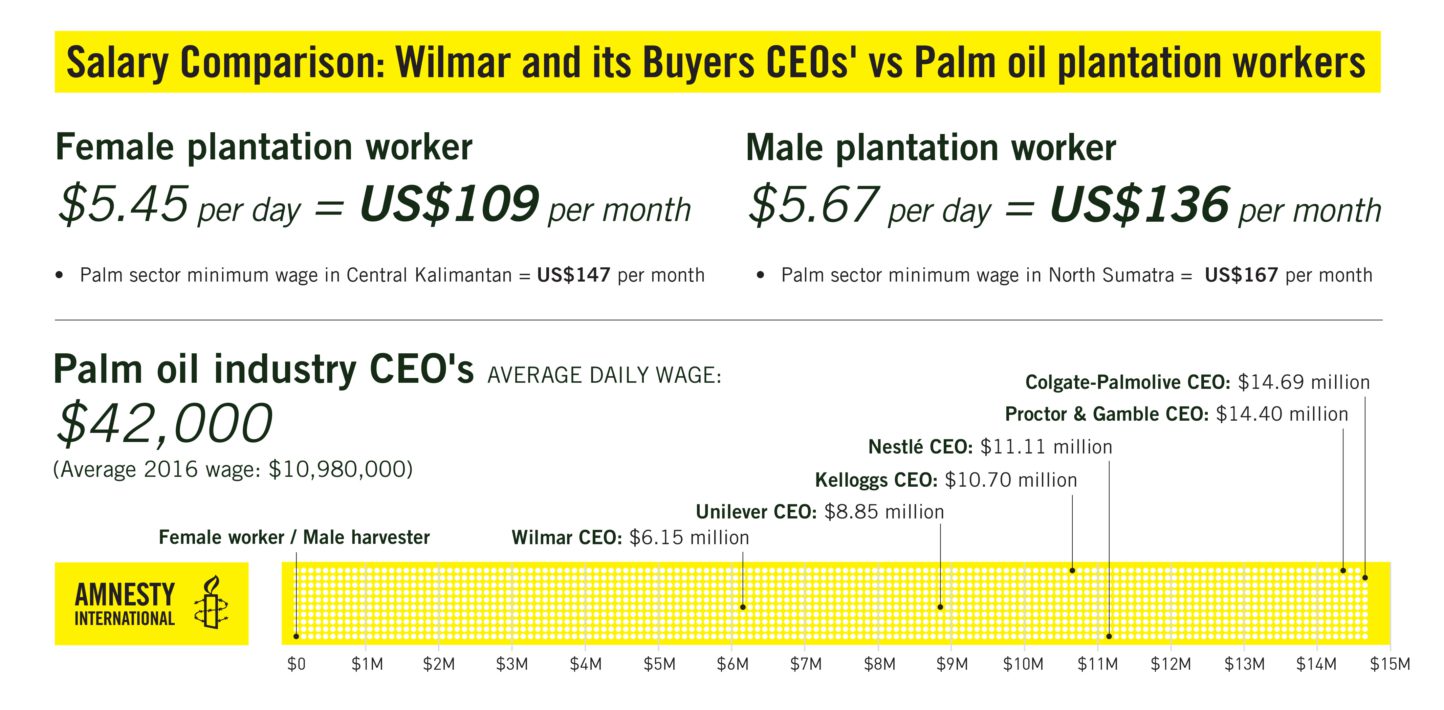
Demand companies take action
Amnesty International traced palm oil exports from Wilmar’s Indonesian operations to nine of the world’s biggest companies. While all the companies admitted they get palm oil from Wilmar, only two would say which products it goes in.
These companies tell their consumers they use “sustainable” palm oil. So why aren’t they putting more pressure on Wilmar to treat its workers better? None of the nine companies said they had ever taken action to deal with labour rights abuses in Wilmar’s operations.
It is time for companies to be more transparent about what goes into some of the world’s most popular brands, and to take action when those products contain the fruits of human rights abuses.
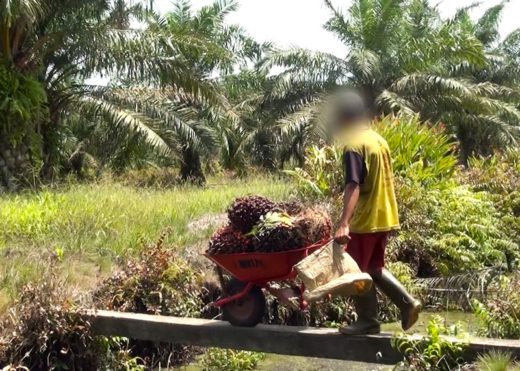

Children as young as eight are doing hazardous, hard physical work on palm oil plantations.
This is because palm oil workers have to meet such gruelling targets to get paid enough to live on, many bring their families with them to help.
Most of the children help their parents in the afternoons, after attending school, and on weekends and holidays. However, some have dropped out of school to help their parents and work all day long, picking up and carrying palm fruits.
The children work without any safety equipment, in an environment full of hazards including falling branches and exposure to dangerous chemicals.
The physically demanding and tiring work can injure young children. They carry heavy sacks of palm fruit that can weigh from 12 to 25kg. They manoeuvre wheelbarrows heavy with fruit over narrow bridges.
I left school to help my father because he couldn’t do the work anymore. He was sick…I would have liked to have gone to school to become smarter. I would like to become a teacher.
A 14-year-old boy who harvests palm fruits
I help my father till 4pm or 5pm. My hand hurts when using the wheelbarrow. I have met the foreman and he said it is good that you pick up the loose fruit.
A 10-year-old boy who helps his father every day after school
Fruits of their Labour
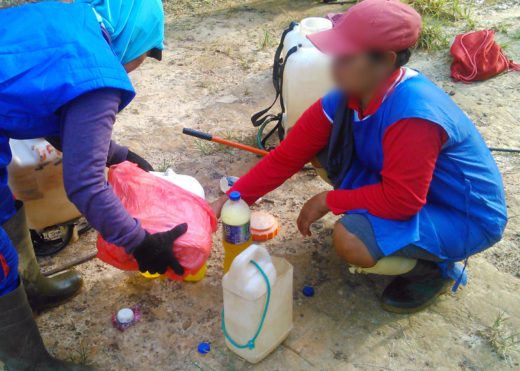
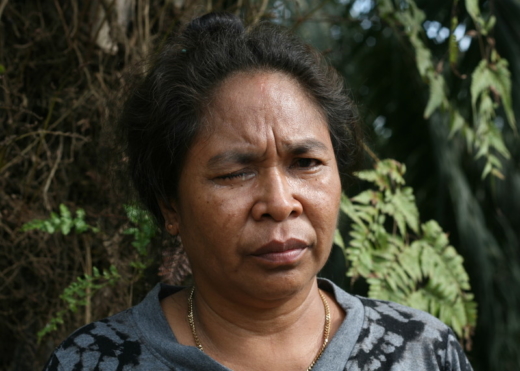
Exposure to toxic chemicals causes terrible suffering
Life for a palm oil worker can go from bad to worse if they are exposed to the toxic pesticides and fertilizers used to maintain the lucrative palm fruit plants.
Workers who spray toxic chemicals suffer vomiting, stomach pain and nails falling off their fingers. Worse still, the faulty equipment they use mean many spilled the chemicals on their hands and backs on a regular basis resulting in severe injuries.
One worker, Yohanna, was splashed in the face with toxic fertilizer while trying to load a spraying tank on her bike. The accident caused permanent nerve damage, blindness in one eye, dizziness and headaches.
I can’t see through the eye. I get headaches in part of my head, when I do, my eye feels really swollen. I still get a bit dizzy. If I use my right hand a lot, my head hurts. I would just like to walk stable like I used to.
Yohanna, a palm oil worker
The fertilizers and pesticides cause so much damage because they contain paraquat, a toxic chemical banned in the EU. Wilmar says it phased out paraquat in 2012, but workers on the plantation are still using it, with tragic consequences.
Indonesia’s Palm Oil Sector
Tell Corporate Giants to Stop Child Labour
Nine multinational companies confirmed they get palm oil from Wilmar’s Indonesia operations, but only two would confirm which products the palm oil goes in. Tweet at your favourite brands to ask companies if they are using palm oil tainted by human rights abuses.

